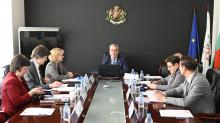On March 28, 2023, a three-day mission of the Organization for Economic Cooperation and Development (OECD) to the National Statistical Institute (NSI) begins. The purpose of the visit is a technical review of Bulgaria in the process of joining the international organisation. As part of the mission, the Deputy Director of the Statistics and Data Directorate at the Organsation for Economic Cooperation and Development (OECD), Ms Asa Johansson and Mr Julien Dupont, Head of Unit and Accession Coordinator, will review the called legal instrument 0417, which refers to the Council's recommendations on good statistical practice. The NSI leadership and experts will introduce the representatives of the OECD to the activities and progress of the Bulgarian institution in the following areas: legal and institutional framework for official statistics; non-financial accounts; government finance statistics and public sector debt; price statistics and purchasing power parities; trade by enterprise characteristics and international trade in goods statistics; business statistics and entrepreneurship; balance of payments and international trade in services statistics; labour statistics; short-term economic statistics; business trend studies and consumer opinion surveys; statistical infrastructure; national accounts and financial accounts and balance sheets; environmental economic accounts; income distribution; time budget and well-being. A special meeting will discuss the data and metadata transmission to the OECD, as well as the next steps for Bulgaria's accession to the organisation.
"Your visit is very important for us, as Bulgaria's membership in the OECD is one of the main goals of our foreign policy, as well as one of the priorities in the activities of the NSI", stated the NSI President Assoc. Prof. Atanas Atanasov, PhD, upon welcoming the OECD mission. "Our joining the organization will be the logical continuation and next key step in building a modern democratic society and a prosperous market economy. It will lead to additional recognition of the stability, potential and attractiveness of our economy for investors, but it will also be a guarantor of Bulgaria's constant commitment to the development and implementation of policies for social and economic well-being", said Assoc. Prof. Atanasov. According to him, the provision of reliable, comparable and timely statistical information is an extremely important condition for the acceptance of Bulgaria as a full member of the OECD.
For her part, Mrs. Kamelia Dimitrova from the Foreign Economic Relations and Development Cooperation Directorate at the Ministry of Foreign Affairs pointed out that the role of statistics for society is extremely important. "I believe that good statistics can demonstrate transparency and accountability in policy-making across all sectors, which, along with leadership, is essential for good governance," she added.
"This is our first mission to Bulgaria, and what we have heard so far shows how important statistics are for your country," Mrs. Johansson pointed out in response.
The organisation and coordination of the process of accepting Bulgaria as a member of the OECD is regulated by Decree of the Council of Ministers No. 242 of August 11, 2022. NSI was designated as a leading institution under legal instrument OECD/LEGAL/0417 - Recommendation of the Council for Good Statistical Practices. This area includes requirements related to the organisation, a clear mandate of institutions within the national statistical system for data collection, ensuring the professional independence of statistical authorities, ensuring adequate human, financial and technical resources, protecting the confidentiality of data providers’ data, ensuring impartiality, objectivity and transparency, etc.
The Organisation for Economic Cooperation and Development is an international organisation with 38 of the world's developed countries as members. The OECD is a forum of representative democracy and market economy that enables comparison between countries in terms of political and economic experience, identification of good practices, coordination of policies, etc. The OECD also conducts one of the most authoritative and large-scale international studies on literacy, the Program for International Student Assessment - PISA, in which Bulgaria also participates.



